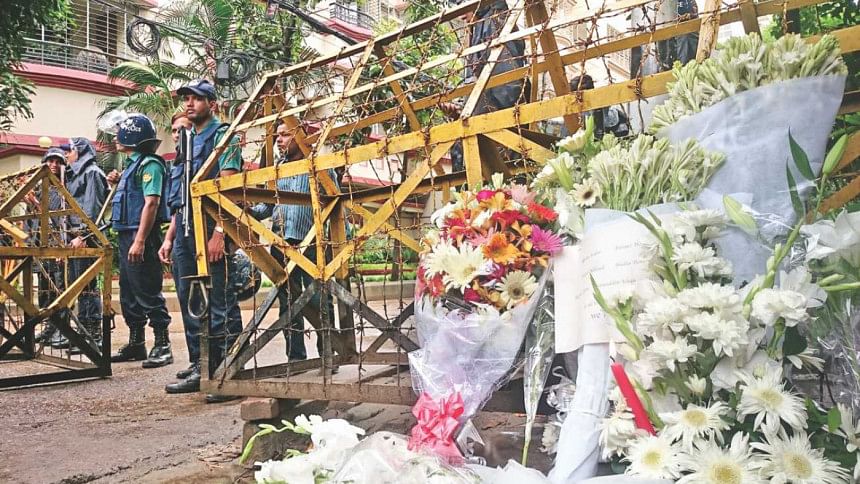It could have been me

These words that are so few and so simple, have weighed heavily on my conscience since the tragic events of July 1 this year. For, just as they are a solemn expression of empathy towards the innocent victims of an unspeakable act of violence, they are also a graphic illustration of the shamefully narrow limits within which that empathy has been applied.
This senseless massacre at Holey Artisan Bakery did not happen in a vacuum. It was part of a persistently escalating series of killings, which started with secular bloggers who were summarily, and often publicly, executed, in the aftermath of the Shahbagh protests. But despite the ferocity and frequency of these killings, the reaction in many of Dhaka's social circles could, charitably, be described as grudgingly sympathetic. The 'religious sensibilities' of a country that is – ironically enough – often reported to be among the most corrupt in the world, was the stated reason for our shocking lack of empathy with these 'secular bloggers'. In other words, what happened to 'them' could not have happened to 'me'.
The same is true for attacks against ethnic and religious minorities, or indeed against expatriates working in Bangladesh. The bombing of the Ashura procession, the Italian aid worker gunned down while jogging home, and even the Hindu priest who was killed while gathering flowers for his temple, on the very morning of the Holey massacre: the list goes on and on, and it is a heart-breaking testimony on our country, that there are too many dead to mention here.
To the best of my ability to keep track of these events, between the Shahbagh protests and the Holey massacre, no fewer than 40 separate, lethal attacks have been allowed to occur. And if I am honest, I must admit, none of them, 'could have been me'. So what is it about Holey that strikes such a chord with 'us'? One could argue it is the location – that it happened in Gulshan, where many of us live or work. Another possibility is that some of us may have gone to similar schools as the victims. But in my opinion, such similarities are incidental, and it would be disingenuous to attribute the full force of our empathy to them.
The simple fact is that the July 1 massacre happened in a place that was created to serve those of us who are within Dhaka's nexus of power and privilege. Holey was a space for us to eat safe food, breathe clean air and feel the green grass under our feet, in a city that affords few of its citizens such luxuries. It was a space for those of us who can afford to spend more on one meal, than many of our countrymen spend on food in a whole month. Such spaces cannot exist without concrete walls and iron gates, manned by private security guards. And as these horrendous events demonstrate, even these fortifications cannot protect us from our own callous disregard for the deaths of our less privileged countrymen.
Privilege and power go hand in hand. Those who were most affected by the murder of the elderly Buddhist monk, who was hacked to death in May, did not have the power to influence national policy. Those of us who 'could have been' at Holey, do. We use that power every day – to lobby for our businesses, to preserve our properties, and to give our children the very best this country has to offer.
If we had used that power to demand that the government seriously address terrorism after the elderly Buddhist monk was butchered in May, we might have saved the Hindu priest who was killed on July 1. We might have prevented what happened later that day, at Holey. But instead, we retreated behind the apparent safety of our concrete walls and private security guards, as people continued to be killed.
We have spent far too long, doing far too little to demand that our government protects the lives of our countrymen, who, in the society we have created to enrich ourselves, have been left without the power to demand it for themselves. And now our futile walls have fallen. Our countrymen have long paid the price for our lack of empathy with the victims of persistent and escalating terrorism. But on July 1, at the Holey Artisan Bakery, 'it could have been me', so maybe we will finally do something about it. Perhaps we will finally see that we are all in this together.
The writer is a PhD. student at the University of Sussex, UK.

 For all latest news, follow The Daily Star's Google News channel.
For all latest news, follow The Daily Star's Google News channel. 



Comments